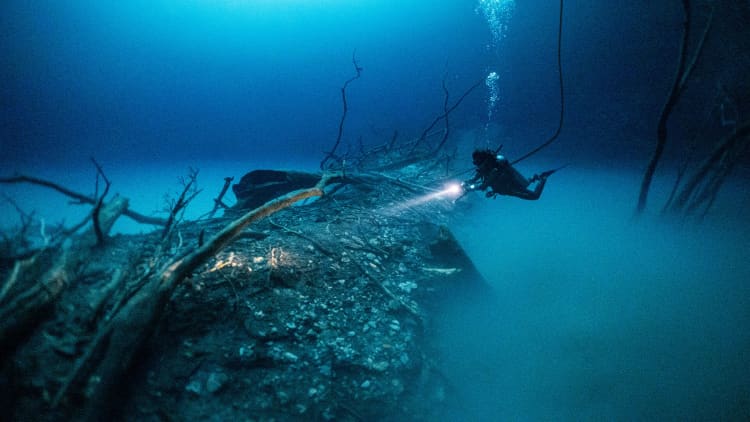The Danish navy stated it was monitoring a Chinese language cargo ship within the Baltic Sea on November 20, 2024, a day after Finland and Sweden opened investigations into suspected sabotage of two severed submarine telecom cables.
Mikkel Berg Pedersen | Ritzau Scanpix | Afp by way of Getty Photos
Geopolitical tensions are brewing globally over the chopping of undersea cables – essential infrastructure that allows cross-border web connectivity – within the Baltic Sea.
The cable chopping led to warnings of ‘sabotage’ and doable ‘hybrid’ warfare towards key infrastructure within the West, amid additional escalations of the continued conflict in Ukraine.
CNBC explains all the pieces you want to know in regards to the undersea incident – and why it is growing world geopolitical tensions.
What precisely occurred?
Two submarine cables had been reduce within the Baltic Sea final week, elevating suspicions that undersea communications methods might be the newest goal of sabotage towards the West because the nation clashes with Russia over Ukraine’s invasion of Ukraine.
One of many cables disrupted was C-Lion1, which connects Finland and Germany and is owned by Cinia, a Finnish state-controlled IT firm. It covers nearly 1,200 kilometers (730 miles) and is the one direct connection of its variety between Finland and Central Europe.
An information visualization map displaying the C-Lion1 submarine cable that related Finland and Germany.
CNBC picture utilizing information from Telegeography
The opposite broken cable was a cable connecting Lithuania and Sweden, BCS East West Interlink. Arelion, the corporate that owns it, stated CNBC’s information visitors was being diverted to alternate connections whereas it repaired the cable. The info visitors flowing by way of the cable is supplied by Telia Lithuania.
In an announcement on Wednesday afternoon, Telia Lithuania stated the BCS East West Interlink cable had been “restored” and visitors flows had been resuming. “This incident reminded us how vital it isn’t to take web connectivity without any consideration,” Telia Chief Expertise Officer Andrius Šemeškevičius stated in an announcement.
Repairing submarine cables is not any small feat, stated Andy Champagne, senior vice chairman and chief expertise officer of Akamai Labs.
“Though we’re related by a fancy bodily internet of fiber optic cables over land, the topology turns into more difficult as soon as we plunge into the oceans,” he instructed CNBC. “It is extremely advanced to put in submarine cables. And if there’s a downside with a submarine cable, repairing it’s a non-trivial job.”
What are submarine cables?
Submarine cables are big fiber optic cables laid on the seabed that carry information akin to internet pages, e mail and video calls between continents. They kind the spine of the worldwide Web and deal with 99% of the world’s intercontinental information visitors.
“Submarine cables are a part of the crucial nationwide infrastructure that carries telecommunications between nations and continents,” Martin Lee, EMEA chief at Cisco Talos, instructed CNBC.
“Their bodily location exposes them to many pure threats akin to saltwater corrosion and landslides, in addition to man-made threats, which can be unintended as a result of fishing actions or malicious in nature.”

Lee stated firms “want to grasp their publicity to a lot of these dangers.” Whereas for some firms a short lived delay in worldwide visitors as a result of a diversion might not be an issue, others can not afford that disruption.
“Companies that depend on quick, instantaneous connections, akin to anybody who must video convention or switch giant quantities of information, are massively uncovered to the implications of cable outages.“ Lee stated.
Who’s responsible?
An investigation is underway and authorities are attempting to establish the perpetrator. The assault has not but been attributed to any single entity or nation.
On Thursday, Finnish International Minister Elina Valtonen instructed CNBC’s “Squawk Field Europe” that the nation is “in shut contact with China.”

Authorities in a number of EU nations are monitoring a Chinese language ship. On Wednesday, a Wall Road Journal report stated investigators suspect the ship’s crew intentionally reduce the cables by dragging the anchor throughout the Baltic seabed.
CNBC couldn’t independently confirm the report. The Chinese language embassy in London was not instantly out there for remark when contacted by CNBC.
Valtonen stated the incident highlights how EU nations have to “focus rather more on the resilience of general connectivity, which is so vital, each in relation to information [and] power infrastructure.”
“If this was a deliberate assault, it could even have implications for international training coverage,” she added.
Germany, with out naming a particular potential suspect, stated it believes the cable chopping was an act of “sabotage” and doable “hybrid” warfare.
In a joint assertion, the international ministers of Finland and Germany stated the incident “instantly raises suspicions of intentional injury,” including {that a} “thorough investigation” is being carried out.
“Our European safety is threatened not solely by Russia’s conflict of aggression towards Ukraine, but additionally by hybrid warfare by malicious actors. Defending our shared crucial infrastructure is crucial to our safety and the resilience of our societies,” she added.



